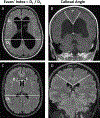Glymphatic System Impairment in Alzheimer's Disease and Idiopathic Normal Pressure Hydrocephalus
- PMID: 31959516
- PMCID: PMC7489754
- DOI: 10.1016/j.molmed.2019.11.008
Glymphatic System Impairment in Alzheimer's Disease and Idiopathic Normal Pressure Hydrocephalus
Abstract
Approximately 10% of dementia patients have idiopathic normal pressure hydrocephalus (iNPH), an expansion of the cerebrospinal fluid (CSF)-filled brain ventricles. iNPH and Alzheimer's disease (AD) both exhibit sleep disturbances, build-up of brain metabolic wastes and amyloid-β (Aβ) plaques, perivascular reactive astrogliosis, and mislocalization of astrocyte aquaporin-4 (AQP4). The glia-lymphatic (glymphatic) system facilitates brain fluid clearance and waste removal during sleep via glia-supported perivascular channels. Human studies have implicated impaired glymphatic function in both AD and iNPH. Continued investigation into the role of glymphatic system biology in AD and iNPH models could lead to new strategies to improve brain health by restoring homeostatic brain metabolism and CSF dynamics.
Keywords: Alzheimer’s disease; aging; dementia; glial-lymphatic; glymphatic; hydrocephalus; idiopathic normal pressure hydrocephalus.
Copyright © 2019 Elsevier Ltd. All rights reserved.
Figures



Comment in
-
iNPH as a '2-hit' Intracranial Hydrodynamic Derangement Disease.Trends Mol Med. 2020 Jun;26(6):531-532. doi: 10.1016/j.molmed.2020.04.002. Epub 2020 Apr 25. Trends Mol Med. 2020. PMID: 32345531 No abstract available.
References
-
- International D and Patterson C (2018) World Alzheimer Report 2018 - The state of the art of dementia research: New frontiers. Alzheimer’s Dis. Int DOI: 10.1103/PhysRevLett.78.4414 - DOI
-
- Wallenstein MB and McKhann GM (2010) Salomón Hakim and the discovery of normal-pressure hydrocephalus. Neurosurgery 67, 155–159 - PubMed
Publication types
MeSH terms
Substances
Grants and funding
LinkOut - more resources
Full Text Sources
Medical

